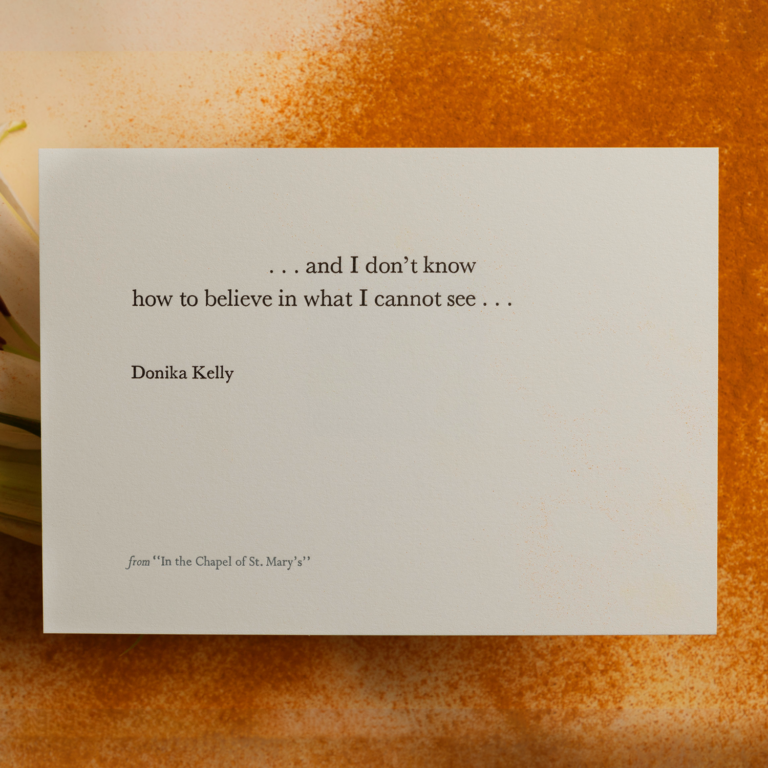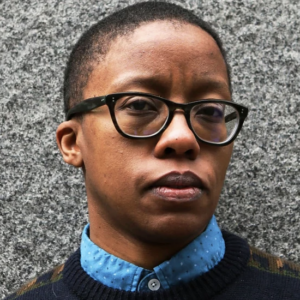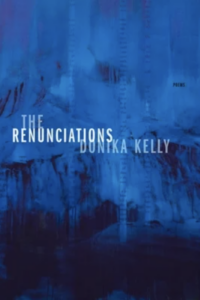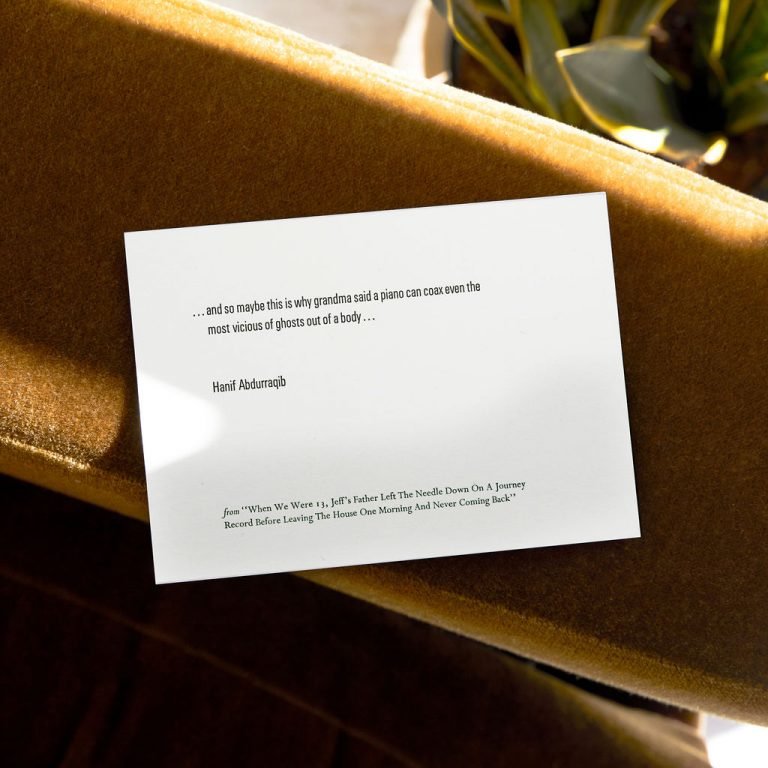Donika Kelly
In the Chapel of St. Mary’s
Why do empty places sometimes lend themselves to reflection or contemplation? In this poem, a poet — describing herself as a nonbeliever — goes into a chapel to sit. In the corner there are some girls talking, there are stained glass windows, and the poet is at once at home in herself and far from the woman she loves. The high emptiness of the church seems to give a resting place for the emptiness she’s feeling. While there’s no resolution, the larger empty space offers a holding place for the poet.

Letterpress prints by Myrna Keliher | Photography by Lucero Torres
Guest

Donika Kelly is the author of The Renunciations and Bestiary, the winner of the Cave Canem Poetry Prize, a Hurston/Wright Legacy Award for Poetry, and the Kate Tufts Discovery Award. A Cave Canem graduate fellow and member of the collective Poets at the End of the World, Donika has also received a Lannan Residency Fellowship, and a summer workshop fellowship from the Fine Arts Work Center. Her poems have been published in The New Yorker, The Atlantic online, The Paris Review, and Foglifter. She currently lives in Iowa City and is an Assistant Professor at the University of Iowa, where she teaches creative writing.
Transcript
Pádraig Ó Tuama: My name is Pádraig Ó Tuama, and years ago, I heard Carol Ann Duffy, who was the then British Poet Laureate, and she was giving a poetry recital in England. She has a famous poem called “Prayer,” and she introduced this poem by saying, “I don’t believe in God, but one of the things that I think would be lovely about believing in God would be the sense that there’s somebody listening.”
And then she said, “For those of us who don’t believe, there’s poetry.” And I’ve never forgotten the way that she honored a practice that she is not part of, and also, at the same time, spoke about how the function of comfort in that practice is something, also, that she has found for herself through art.
[music: “Praise the Rain” by Gautam Srikishan]
“In the Chapel of St. Mary’s,” by Donika Kelly:
“I can’t tell you what happened
there, why I entered the sanctuary,
a non-believer. Only that I
have been thinking about worship,
the altar of the body and supplication,
for some time. My thoughts turn,
as they often do in this season of absence,
to my wife, and how tired a god can get
when called, and too often, for little reason
but loneliness. Of course I don’t mean god here,
but rather the woman I love, who alters
the orbit of my life, pulls me with the density
of light toward her, the draw thinner
when she is farther away, as she is now.
I try to find comfort in the inevitability
of science, when what I lack is faith.
The sanctuary—the stained glass,
four girls saturating it with soft chatter,
small pots of stargazer lilies, a lace ribbon
for each pew—this place is full of faith
in the unknown, and I don’t know
how to believe in what I cannot see.
Tonight, I will drive through the foothills
and into the valley. I will try to make
a little practice, to trust you are with me,
even though you are somewhere else.”
[music: “Every Place We’ve Been” by Gautam Srikishan]
I’d been looking forward to this new book from Donika Kelly for a while, and I was so struck by this particular poem. There is a real poise, a real silence in the middle of it. The first thing that struck me is the way that the poet is writing about their wife and God; and ultimately, underneath both of those, there’s serious questions about presence and absence.
I thought that the poem held an extraordinary line in it about what it means to believe — in anything, not just in religion: in love; in a relationship; in what you can’t see right in front of you.
What I think is really interesting is that Donika Kelly has located a poem where the speaker of the poem is inside a place that’s filled with so much emptiness. Most chapels have ornamentation and decoration around them, of course, but because most chapels are high, have certain vaulted ceilings, ultimately you’re walking into a room where the majority of that room is empty. This isn’t a frightening emptiness; this is a kind of a generous emptiness, a way where the external location of the poet has been seeking some kind of validation to make sense about a spaciousness, a distance, a certain kind of emptiness inside her that she’s wishing to have a conversation with and about.
[music: “Rainday” by Blue Dot Sessions]
Donika Kelly shows us the chapel with flowers and ribbons. And there’s some girls talking quietly, stained glass and the “small pots of stargazer lilies” and “a lace ribbon / for each pew.” It seems like the chapel is dressed for something — a wedding, a sacrament that’s going to be happening — it’s hard to know exactly what might be happening. But what’s really interesting is that the observation is generous, to notice all these things around, to observe the growing things, to observe the ornamentation of the chapel, and, in the context of that, to find space for self, also: “this place is full of faith // in the unknown, and I don’t know / how to believe in what I cannot see,” she says. She sees so much inside this chapel, and she’s asking some more questions about what else is it that she is not seeing, these days, and how can she consider the question as to whether she believes in what she isn’t seeing?
This poem started off by a poet going into a building, a chapel, and where the physicality of the building represents worship, and the altar of the body, and supplication, too. And toward the end of the poem, she’s planning a drive “through the foothills / and into the valley.” The poem is really attuned to how the physicality of space can help her reflect on other things that are happening. So the chapel has helped. And I find myself really hoping that the valley helped, too, and the foothills, and the soft voices of the girls inside that chapel, and all of the other things that are brought there.
So the geography and the architecture and the space and practice of this chapel is a place where Donika Kelly brings questions about what she’s giving attention to, and the body and desire and presence and absence. These are foundational questions, really, about the human experience. And in this particular poem — a poem that’s full of love, even though the poem is about a marriage that ultimately didn’t last — this poem is a really generous one about what it means to be present to a certain kind of emptiness and to weigh that emptiness in your own life and think, How am I going to go forward?
And one of the things that’s of real interest to me is to reflect on where do I go for comfort, or even a certain kind of self-confrontation or a kind of a reflection? How is it that I choose a geography that tells a deeper truth than just, Oh, I like it, or, I find it pretty, or, It’s empty? How can I reflect on the deep intelligence of the places that I tend to go for different kinds of reflection?
[music: “In Paler Skies” by Blue Dot Sessions]
There’s a certain kind of privacy in this poem. The opening line is, “I can’t tell you what happened,” and then there’s a line break for “there.” And so if you just look at the very first line, all it says is, “I can’t tell you what happened.” This doesn’t seem particularly to be a poem of trauma, but this particular poem has a deep privacy, and a certain kind of respect and circumspection. There’s a recognition of the things that are distant, but those distances aren’t being used, in this poem, for voicing accusation or blame or fury. And this is, I think, one of the reasons that I love this poem, because the privacy and the respect that the poet is affording herself in the poem — and whoever else is gathered into the poem, too — I find to be considered as a sacred thing. This poem is a mature reflection on distance and consideration and trying to figure out, trying to work out, how to pay attention to the question of something that seems to be drifting apart.
Donika Kelly does write other poems of extraordinary justice and truth-telling and exposure, and also writes other poems of extraordinary love and delight. This is neither of those. This is a poem of rich and pure poise. And what I think is brilliant is that she uses the question of God and the fact that she’s a non-believer to open up the question about, well, what else don’t I believe in anymore?
[music: “Waterbourne” by Blue Dot Sessions]
The poem, even though it isn’t a poem about prayer, does culminate towards the end with this exquisite usage of the word “you,” which is often a word that you can associate with prayer. The last lines say, “I will try to make / a little practice, to trust” that “you are with me, / even though you are somewhere else.” So in my reading of this, I think that the “you” is the wife, this woman that she loves, but it is a playing in a certain sense on a form of prayer, and recognizing that the non-believing in God, in the poet’s mind, is a way, too, to reflect on the question about a certain tender distance — but a serious attention to this tender distance that is growing between the poet and the woman she loves.
There’s a searching for comfort in this poem. You know, the poet has things in her mind and is going into a place where she can think. And in her thoughts about why she might feel sorry for the God she doesn’t believe in, she realizes that the distance between herself and that God is also telling a truth about the distance between herself and her wife. And she’s looking for “comfort in the inevitability / of science,” but she says, “what I lack is faith.”
And faith in what? I don’t think the question of this poem is faith in God. I think it’s a meditation on distance. And she’s come to a place to be present to absence, and to try to map out the space that she’s in.
There’s that really clever part of the poem where Donika Kelly speaks about how “god” must get tired of only being called out when people are lonely, and then saying, Look, obviously I’m not speaking about God, I’m speaking about the woman I love. And so we hear, here, about how relationships can have loneliness at the heart of them, too. There’s a question here about how to pay attention to loneliness and how the loneliness is pointing to a certain distance; and rather than thinking, Of course, that distance needs to be closed, there’s a question as to, Maybe this distance needs to be believed in.
[music: “Memoriam” by Gautam Srikishan]
“In the Chapel of St. Mary’s,” by Donika Kelly:
“I can’t tell you what happened
there, why I entered the sanctuary,
“a non-believer. Only that I
have been thinking about worship,
“the altar of the body and supplication,
for some time. My thoughts turn,
“as they often do in this season of absence,
to my wife, and how tired a god can get
“when called, and too often, for little reason
but loneliness. Of course I don’t mean god here,
“but rather the woman I love, who alters
the orbit of my life, pulls me with the density
“of light toward her, the draw thinner
when she is farther away, as she is now.
“I try to find comfort in the inevitability
of science, when what I lack is faith.
“The sanctuary—the stained glass,
four girls saturating it with soft chatter,
“small pots of stargazer lilies, a lace ribbon
for each pew—this place is full of faith
“in the unknown, and I don’t know
how to believe in what I cannot see.
“Tonight, I will drive through the foothills
and into the valley. I will try to make
“a little practice, to trust you are with me,
even though you are somewhere else.”
[music: “Praise the Rain” by Gautam Srikishan]
Chris Heagle: “In the Chapel of St. Mary’s” comes from Donika Kelly’s book The Renunciations. Thank you to The Permissions Company on behalf of Graywolf Press, who gave us permission to use Donika’s poem. Read it on our website, at onbeing.org.
[music: “Praise the Rain” by Gautam Srikishan]
Poetry Unbound is: Gautam Srikishan, Erin Colasacco, Eddie Gonzalez, Lilian Vo, and me, Chris Heagle.
Our music is composed and provided by Gautam Srikishan and Blue Dot Sessions.
This podcast is produced by On Being Studios, which is located on Dakota land. We also produce other podcasts you might enjoy, like On Being with Krista Tippett, Becoming Wise, and This Movie Changed Me. Find those wherever you like to listen, or visit us at onbeing.org to find out more.
Books & Music
Recommended Reading
The On Being Project is an affiliate partner of Bookshop.org and Amazon.com. Any earnings we receive through these affiliate partnerships go into directly supporting The On Being Project.







